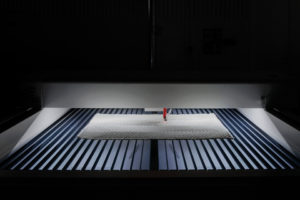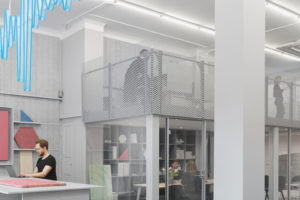Transportation
36% of our total CO2 emissions

Reducing transportation emissions as much as possible
Transportation from BAUX manufacturing facilities to customer premises constitutes 36% of our total emissions and we are constantly finding out ways of smart logistics to reduce this figure. The emissions from transportation should also be considered in the context of BAUX’s low emissions from raw materials and manufacturing. As an environmentally conscious consumer, you should make your product selection based on the right materials rather than the manufacturing location.
Why? Incorrect raw materials and poor manufacturing processes usually emit much more CO2 than international transportation. Therefore, shopping locally is not always the best solution.
BAUX Acoustic Wood Wool
BAUX wood fibres are FSC® and PEFCTM certified –– guaranteeing that they can be traced back to responsible forestry operations. The wood is collected from the Swedish forest in the direct surroundings of the factory in order to minimise negative CO2 emissions caused by longer transport distances. The small amount of wood waste that is generated as a result of production is taken care of—80% is used to heat the factory and drying plant. No waste is produced from the timber log.
CO2 emissions kg/m2
Raw Materials
- Wood, cement and water.
- We use locally harvested FSC certified pine and spruce from Swedish forests.
- We use 100% natural materials with no additives.
- Our cement provider, Cementa, has been recognised as the world’s most sustainable cement factory. Read more about this under ‘Installation & End of life.’
Manufacturing
- Sweden, the USA and Australia.
- The raw materials we use are produced in Sweden, in our factory that runs on 100% renewable energy.
- We use low waste production methods.
- We have production plants in the USA and Australia to ensure the final parts of the manufacturing process take place closer to our end customers.
Transport
- From factories to the end client, this includes samples and the final product. This is a weighted average taking all deliveries during 2022 into consideration.
- We aim to produce as few emissions as possible during the transportation of products.
- We transport products to clients on the ground by truck, and rarely use air transportation.
- We have an efficient raw materials logistics solution that provides materials to the USA and Australia.
Installation & End of life
- Installed wood wool products lead to reduced energy consumption due to their heat accumulating performance.
- All wood wool products have a long life and fifty-year warranty.
- Wood wool captures a significant amount of CO2 from the atmosphere, leading to reduced CO2 emissions.
- The recycling process Circle allows clients to return outdated panels as raw materials for new production.
kg CO2e per m2
Wood: 0,05
Cement production: 8,99
Cement carbon capture: -6,29
Packaging materials: 0,01
Raw materials total emissions: 9,04
kg CO2e per m2
Manufacturing Total: 4,88
kg CO2e per m2
From factory to end clients: 8,28
%
% of carbon capture: -70%
This means that we have a 70% reduction in the total CO2 created from wood wool cement production.
BAUX Acoustic Pulp
The Raw materials that Acoustic Pulp is made from are very low in kg CO2e per m2, when compared to corresponding materials on the market (Cellulose, Wheat Bran, Potato Starch and Plant Wax). We take pride in our materials, and Acoustic Pulp is definitely not an exception!
The Acoustic Pulp manufacturing process is highly sustainable and technological.
CO2 emissions kg/m2
Raw Materials
- Cellulose, potato starch, wheat bran and plant wax.
- We use organic and locally harvested cellulose and the wheat bran is a rest product.
- The wood we derive our cellulose from is FSC
Manufacturing
- The factory is run on hydropower.
- 100% renewable energy sources are used for production.
- There is zero waste produced during production.
Transport
-
From factories to the end client, including samples and the final product.
-
We aim to produce as few emissions as possible during the transportation of products.
-
We transport products to clients on the ground by truck, and rarely use air transportation.
Installation & End of life
- Acoustic Pulp is the world’s first biodegradable acoustic panel.
- The panels are 100% circular, and used panels may be moulded and used for reproduction.
- The recycling process Circle allows clients to return outdated panels as raw materials for new production.
k.CO2e per m2
Wood/pulp: 0,44
OC-BioBinder™: 0,249
Raw materials total emission: 0,5
kg CO2e per m2
Sweden: 2,10 (Renewable energy: Yes)
kg CO2e per m2
From factory to end clients: 1,08
BAUX Acoustic Felt
It is challenging to provide an exact value for the carbon dioxide (CO2) emissions associated with recycled PET throughout the entire supply chain, as it involves multiple stages, including collection, sorting, cleaning, reprocessing, and distribution. Additionally, the carbon footprint can differ between different recycling facilities and regions due to variations in energy generation and transportation methods.
That being said, studies have estimated that recycling PET can save around 30-60% of CO2 emissions compared to producing virgin PET. This reduction is primarily due to the avoidance of extracting and processing new fossil fuel resources, as well as the energy savings during the recycling process.
To calculate a fair number of our Co2 for Felt – Recycled PET, we have used an average of the kg CO2e per m2 of Wood Wool & Pulp.
CO2 emissions kg/m2
Raw Materials
- 100 % PET whereof 60-65 % Post Consumer Recycled content Oeko – Tex Standard 100, class I
100 % Recyclable. - GRS Certified source of recycled PET Accredited by IOAS
Source: Recycling entities across Europe
Manufacturing
-
The factory is environmentally certified according to ISO 14001.
-
The water-jet cutting of different panel sizes is made with minimal waste.
-
Investment in R&D projects dedicated to advancing the development of PET recycling.
Transport
- From factories to the end client, including samples and the final product.
-
We aim to produce as few emissions as possible during the transportation of products.
-
We transport products to clients on the ground by truck and rarely use air transportation.
Installation & End of life
-
We approach sustainability in everything we think and do daily. This commitment does not end even when the acoustic products have reached the end of their useful life. That’s why we make it easy for you to have a positive impact on the environment while upgrading your space at the same time. Our Circle will support you all the way.
kg CO2e per m2
PET: 4,7*
kg CO2e per m2
Sweden: 3,5 *
kg CO2e per m2
From factory to end clients: 5*
* To calculate a fair number of our Co2 for Felt – Recycled PET, we have used an average of the kg CO2e per m2 of Wood Wool & Pulp.
Other
Employees and business travel
-
All employees are offered the option to purchase a discounted bike for their office commute.
-
We offer flexible work hours, and all employees receive generous health benefits to spend on either a gym card or massages.
-
We walk, bike and take the tube to meetings. If we drive, we do so electric cars
Our office
- We have a central office location in Stockholm, giving all our employees the possibility to easily walk, cycle or commute to the office.
- Our office runs on 100% renewable energy and we try to use the space as effectively as possible.
Fairs and fair stands
- When showcasing the BAUX brand and products at fairs and events, we aim to reuse materials whenever possible.
- We borrow or rent furniture and products from our friends and colleagues in the industry to reduce both CO2 and money spent.
Total CO2: 2,0 of total CO2
Our office: 0,07 of total CO2
Fairs total CO2: 0,07 of total CO2


